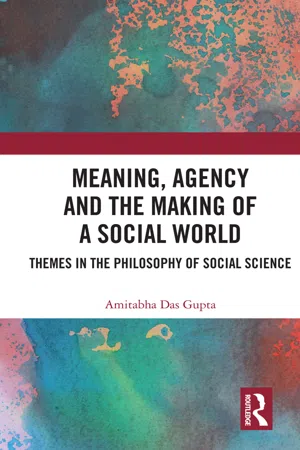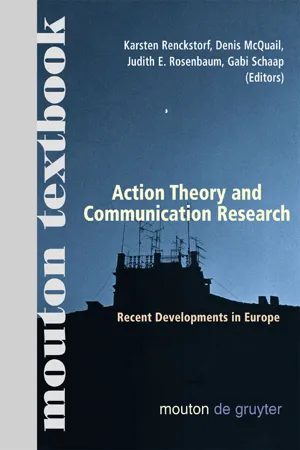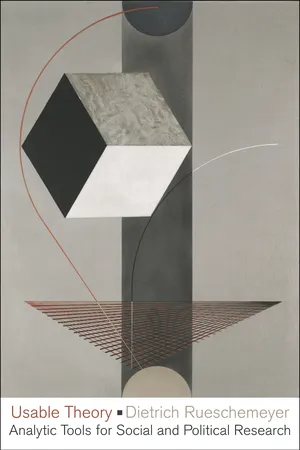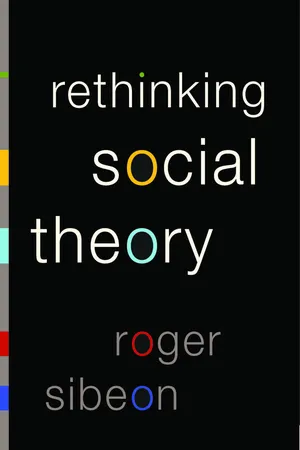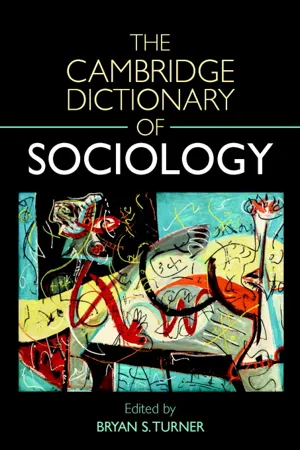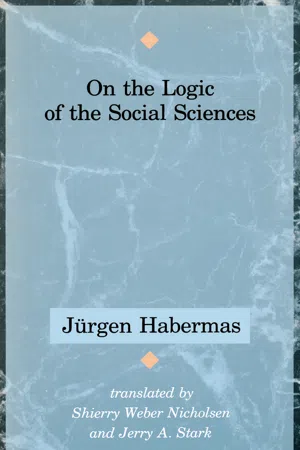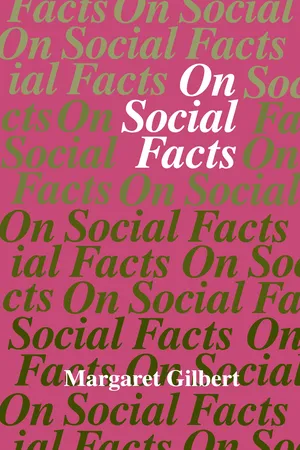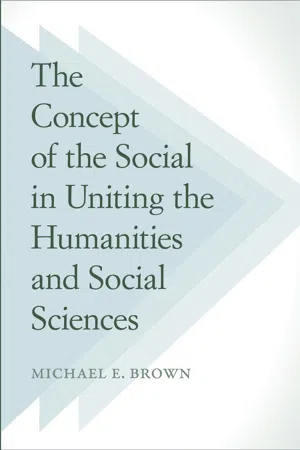Social Sciences
Social Action Theory
Social Action Theory, developed by sociologist Max Weber, emphasizes the significance of individual actions and their subjective meanings in shaping society. It focuses on understanding human behavior within specific social contexts, highlighting the role of intention, interpretation, and agency. This theory underscores the diversity and complexity of human actions, challenging deterministic views of social change.
Written by Perlego with AI-assistance
Related key terms
1 of 5
8 Key excerpts on "Social Action Theory"
- eBook - ePub
Meaning, Agency and the Making of a Social World
Themes in the Philosophy of Social Science
- Amitabha Das Gupta(Author)
- 2019(Publication Date)
- Routledge(Publisher)
The other side of meaning dualism is the intentionalist dilemma in meaning. This is a conception of meaning which ascribes primacy to the role the agent or the author takes in the formulation of meaning. Explanation of human action or of literary text is largely determined by the agent’s or the author’s intention. The term ‘intention’ used here is a cluster term that includes values, goals, purposes, reasons, etc. It is because of this perspective the emphasis is shifted from the objective structure to the individual – the subject. This is the reason why this perspective is also characterized as the subjective aspect of meaning.In social theory this perspective thus laid down a parallel approach to social reality. It is due to the emphasis on individuals and the role that they play that society is thus thought to be not independent of the individuals. Society, on the other hand, is viewed as the creation of the individuals and their actions. The idea of actor or the human actor becomes the basic unit of social analysis. Giddens brings this entire perspective under the framework of what he describes as action theory. Within the purview of action theory, the following approaches to the social sciences may be thought of, such as ethno-methodology, interpretive sociology, phenomenological sociology, etc. The philosophical foundation of all of these inquiries is built on hermeneutical tradition and thus the method that they mostly employ for their inquiry is the method of understanding or Verstehen.In this respect, among the various attempts made to provide the philosophical foundation of action theory, we may refer to Taylor’s work (1985a, 1985b), which seeks to restore human subjectivity and to show the constitutive role that it plays in the creation of social reality. To achieve this, Taylor explores the various forms of human subjectivity and the meaning that they ascribe to social reality. The category that is central to this endeavour is human action or the intentional structure of human action.A similar approach was initiated by Searle (1995) from the analytical tradition of philosophy of language. There is an inseparable connection existing between intentions and actions. It is this connection, as Searle argues, which is responsible for the creation of social ontology. We create social reality through performing various speech acts which are after all actions. To put it in J.L. Austin’s phrase, a speech act implies doing something with words. Speaking must be thus regarded as acting. The various instances of speaking, such as asserting, apologizing, criticizing, promising, ordering, requesting, etc., are instances of acting. The importance that Searle finds in these speech acts, as discussed in the Chapter 5 - eBook - PDF
Action Theory and Communication Research
Recent Developments in Europe. (Mouton Textbook)
- Karsten Renckstorf, Denis McQuail, Judith E. Rosenbaum, Gabi Schaap, Karsten Renckstorf, Denis McQuail, Judith E. Rosenbaum, Gabi Schaap(Authors)
- 2008(Publication Date)
- De Gruyter Mouton(Publisher)
Action theory as part of social science 13 2 Action theory as part of social science Erwin K. Scheuch (†) Abstract Ever since the late sixties, social sciences have moved from macro sociology and quantitative research to micro sociology with the preferential use of quali-tative material. In economics, this has led to a shift from macro economics to micro economics, and in sociology to a waning of structural functionalism and an ascent of various forms of ‘interpretive sociology’. When applied to the field of mass media, this development leads to an emphasis on the subjective inter-pretation of media messages, and specifically to the view that the audience shapes the effects that media have. This contradicts earlier ideas stating that the media effects on people are weak. Katz, as supporter of this view, has later conceded that there are situations where media have strong effects, and ‘Action Theory’ appears especially applicable in such situations. Keywords: macro versus micro sociology, interpretive sociology and media, ‘strong effects’ and ‘weak effects’, action theory Changing foci in theorizing There is still no general theory in sociology, despite bold attempts to the contrary and a widespread yearning that these attempts would be successful. The famous system-builders of the turn of the century, especially Spencer (1879), had few followers in successive decades. One of those followers was Leopold von Wiese (1933) in the 1920s and, since 1937, Talcott Parsons (1973). Both were very successful at the time when their general theories were formulated, and both were quickly forgotten after their deaths. The plausible reaction to this state of affairs would be an attempt to specify the realm in which various partial theories would be most appli-cable, but unfortunately this is not the case. - eBook - PDF
Usable Theory
Analytic Tools for Social and Political Research
- Dietrich Rueschemeyer(Author)
- 2009(Publication Date)
- Princeton University Press(Publisher)
It leaves open the possibility that alternative views are supported for good reasons. In fact, it is quite likely that any comprehensive theoretical frame-work plays down some important features of social life, even to the point of virtually excluding them from view. Therefore we may well suspend our option for action theory in the study of certain problems. 2 Equally important, I have no intention of embracing ideological affini-ties that have been associated with a paradigm of intentional individual action. The action frame does not commit its users to a philosophy of individualism and a libertarian view of individual freedom, which some rational action theorists espouse. Nor does its adoption entail a distancing 2 Occasionally employing alternative broad orientations may be as worthwhile as seeking to integrate contrasting emphases in a hybrid. Reinhard Bendix and Bennett Berger (1959) suggested such alternation as a strategy for gaining broad theoretical orientations. A GENERAL FRAME 29 from the ideas of solidarity and equity grounded in ontological views of social reality such as those of Emile Durkheim. Yet there are good reasons for choosing action theory as a comprehensive theory frame. In both of its traditions, it has proven itself fruitful—a source of more focused theoretical investigation and a powerful tool of integrating a variety of particular inquiries. Both approaches begin with the model of a goal-oriented actor who finds herself in a physical and social environment relevant for the attain-ment of her goals. They differ in their conception of this actor. Weber (1922/1978) held that “meaningful action”—in contrast to sheer “behav-ior,” conceived as devoid of subjective meaning—must be the elementary building block of social and political analysis. That means in the first place that social action must be explored from the point of view of the actor. And it entails also that action is embedded in social relations, large and small. - eBook - PDF
- Roger Sibeon(Author)
- 2004(Publication Date)
- SAGE Publications Ltd(Publisher)
5 Social Action, Power and Interests The previous chapters gave expression to the premise that social theorists, in seeking to reflect systematically upon the nature of the social, invariably find it necessary to in one way or another confront the metatheoretical themes that were identified in the first chapter. In relation to those themes the discussion thus far has tended to concentrate on concepts and theo-retical issues to do with agency–structure, and to a lesser extent micro– macro; in the present chapter, while continuing to recognize agency/action and social structure as major dimensions of social reality, it is proposed to broaden the scope of the earlier analysis by addressing the idea of social chance , and also by examining conceptions of power and interests . As in all the chapters, the postulates and concepts developed in the following pages subsume critique of the four illicit forms of theoretical and methodologi-cal reasoning – reductionism, essentialism, reification, and functional teleology – that were defined in the Introduction (other, less appropriate definitional terms are sometimes applied to these forms of reasoning): as demonstrated earlier, versions of these problematical modes of theorizing continue to exert a damaging influence upon social theory and social science. The chapter opens with some preliminary remarks on agency and social action, the intention being to ground the later discussion in a restatement and extension of a number of earlier observations concerning agency and the important concept actor (or agent). 118 Agency and social action In their account of the nature of sociology as an academic discipline,Turner and Rojek (2001: 144) rightly observe that ‘the tension between determin-ism and voluntarism is integral to sociological analysis’. Central to this ten-sion, of course, is the debate of agency and structure. - eBook - PDF
- Bryan S. Turner(Author)
- 2006(Publication Date)
- Cambridge University Press(Publisher)
D A R I N W E I N B E R G act – see action theory. action research – see action theory. action theory “Did he jump or was he pushed?” Jumping is an action. Being pushed is an event. Action theory is an approach to the study of social life that is based on the ontological premise that people jump. For example, the flow of traffic on a busy street differs from the flow of electrons on a copper wire. Elec- trons are pushed, drivers are not. From a struc- tural perspective, we can learn a great deal about the flow of traffic by focusing on exogenous deter- minants, without ever knowing much about what drives human behavior. While few action theorists 1 would disagree with the value of structural analy- sis, they also see the need to look beyond the constraints on action, to the intentions, purposes, and goals that motivate efforts to push back. Action theory has roots in Max Weber’s inter- pretative method and in Talcott Parsons’s effort to integrate this with E ´ mile Durkheim’s macro- social approach. In “The Place of Ultimate Values in Sociological Theory,” Parsons insisted that “man is essentially an active, creative, evaluating creature” whose behavior must be understood in terms of the ends of action, and not “in terms of ‘causes’ and ‘conditions’” (1935). His “voluntaristic theory of action” opposed the deterministic ac- count of human behavior as “pushed,” whether by Sigmund Freud’s “unconscious” or Pavlov’s bell. Action theory informs a diverse range of contemporary sociological theorizing, including rational action, symbolic interactionism, conflict theory, and hermeneutics. Conceptually, there are two main branches – one based on interests, the other on identity. Rational-action theory posits instrumental pursuit of self-interest, which can include an interest in public as well as private goods and an interest in social approval and avoi- dance of sanctions. - eBook - PDF
- Jürgen Habermas, Shierry Weber Nicholsen, Jerry A. Stark(Authors)
- 2015(Publication Date)
- Polity(Publisher)
Sociology is concerned only with institutionalized values. We can now formu- late our question in a more specific form: How are general theories of action in accordance with institutionalized values (or prevailing norms) possible? General theories of this kind must proceed from basic assumptions that cover neither only the empirical context of observable events nor only the logical context of symbolized meaning. For, on the one hand, prevailing norms are institutionalized contexts of meaning that cannot be adequately expressed in variables of observable be- havior; and, on the other hand, they do not have the form of pure maxims of strategic action from which possible decisions can be de- duced. The required theories must permit assumptions about the empirical context of prevailing norms. In one sense this context ex- tends beyond the subjectively intended meaning ofthose who act in accordance with norms; but as a real connection among norms it shares with them the element of meaningfulness. The connection is not intended by the acting subjects, but at the same time it is inten- tional. We can also say that the meaning institutionalized in rules and roles is manifest, whereas the meaning of the objective context 76 On the Methodology of General Theories of Social Action of these roles remains latent. Lawlike assumptions appropriate for the explanation of communicative action refer to covariances of grammatical rules, social roles, and empirical conditions that are in turn latently meaningful. This is a consequence of the intelligibility of social facts. The meaning intended in action and objectivated both in lan- guage and in actions is transferred from social facts to the relation- ships among facts; there is no empirical uniformity in the domain of social action that is not intelligible, even though not intended. - eBook - ePub
- Margaret Gilbert(Author)
- 2020(Publication Date)
- Princeton University Press(Publisher)
II ‘SOCIAL ACTION’ AND THE SUBJECT MATTER OF SOCIAL SCIENCE1 INTRODUCTION
Max Weber’s technical concept of social action (Soziales Handeln) is, roughly, the notion of an action by one person which takes account of someone else. (I shall give a more precise account of it shortly.) Weber regarded this notion as a fundamental sociological concept. He explicitly delimited sociology in terms of it. Thus in Economy and Society he writes:1Sociology (in the sense in which this highly ambiguous word is used here) is a science which attempts the interpretive understanding of social action. (p. 88) And he says that social action is sociology’s central subject matter, that which may be said to be decisive for its status as a science. (pp. 114-15)In this chapter I consider a question that is naturally provoked by Weber’s claims. It is not concerned specifically with the kind of sociology Weber wished to develop, but with the idea of a social science (or social study) in general. I take it that the idea of a social science is equivalent to the idea of a science with (or connected to) a specific (‘social’) type of subject matter. Can an effective, unitary characterization of those sciences aptly referred to as social sciences be given in terms of Weber’s technical concept of social action?If the answer to this question is positive, this will have a direct bearing on the issue at the centre of this book, the issue of how the intuitive concept of a social phenomenon is to be explicated. For suppose Weber’s concept can give an effective unitary characterization of any science aptly referred to as a social science. It is reasonable to expect that it will at the same timeeffectively characterize our intuitive concept of a social phenomenon. (Perhaps it could fail to do this, if the range of our intuitive concept included things that for some reason must be excluded from the scientist’s domain.) It is possible, then, that Weber’s concept of social action can solve for us, without further ado, the problem of characterizing the nature of social phenomena in general, as intuitively conceived. - Michael E. Brown(Author)
- 2014(Publication Date)
- Temple University Press(Publisher)
The inhabitants of such a universe no longer resemble those who inhabit the universe in which the theory of action allows for none of the ambiguities and paradoxes discussed previously. In that case, we are at the beginning of an attempt to address the question that was the original working title of this book, “What is human about human affairs?” Before that, it is necessary to re-mind ourselves that any theory of action, of what is being done, must deal with two logically related facts: that the distinction between actor and other cannot be sustained at the level of theory, and, therefore, that the distinction between action and context cannot be sustained—no matter that each distinction may have extra-theoretical value. It is now clear why we are unable to use the theory of action to explain what is meant by saying that human beings are essentially social. The attempt to clarify the concept of sociality by importing “others” in the explanation of action fails because the explanation of action makes obscure the logical con-ditions of taking account of others as human beings. Something else must be meant by “social” than “taking others into account” or “taking the behavior of others into account.” Whether this can be made clear by beginning with Social Action Reconsidered 279 individuated subjects and determining how they might compose a social en-tity or process or by trying to expand on the pre-theoretical notion in order to bring about the same result does not seem to matter. What counts is describing what is irreducible about the social and being able to refer non-categorically to conditions under which it is possible to conceive of agency and activity as instances of being social.
Index pages curate the most relevant extracts from our library of academic textbooks. They’ve been created using an in-house natural language model (NLM), each adding context and meaning to key research topics.
